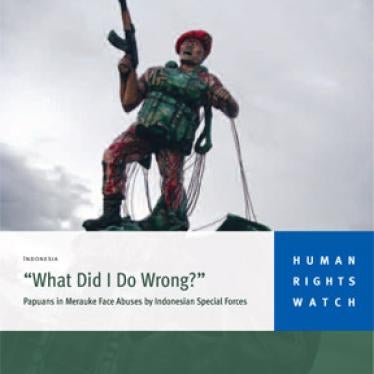Hillary Clinton
Secretary of State
US Department of State
2201 C Street, NW
Washington, DC 20220
Dr. Robert M. Gates
Secretary of Defense
US Department of Defense
1300 Defense Pentagon
Washington, DC 20301
Re: US Plans to Reengage with Indonesia's Special Forces
Dear Secretary Clinton and Secretary Gates :
In a letter to Secretary Gates dated February 4, 2010, we outlined concerns about the state of military reform in Indonesia and various steps the United States should take before resuming partial or complete training to Indonesia's Special Forces (Komando Pasukan Khusus, or Kopassus).
In recent weeks, US officials have suggested that the Department of Defense may be seeking to resume US military training for members of Kopassus, and particularly in the area of counter-terrorism. This raises a number of serious questions about the US's commitment to withholding military assistance to foreign military forces that have committed serious violations of human rights. These questions stem from unique aspects of the Kopassus counter-terrorism component known as Unit 81, the entity whose members the Department of Defense presumably seeks to train.
The operational component of Unit 81 appears to have existed since 1982, when Kopassus established an elite counter-terrorism force known as "Detachment 81." That force has been reorganized once in 1995, when it was enlarged and renamed "Group 5," and again in 2001, when it was reduced in size and renamed "Unit 81."
Since its creation, Unit 81's activities have been largely shrouded in secrecy. Members of Unit 81 reportedly rotate through other Kopassus components and units, including Group 3 (which contains Kopassus' notorious "covert war" unit). In addition, members of what is now known as Unit 81 have accompanied Kopassus combat units or other military personnel in field operations, including in Aceh and East Timor, although they remained under the command of their superiors headquartered in Jakarta.
In several instances, members of what is now called Unit 81 have been credibly accused of serious human rights abuses or other improper conduct, for instance, in controlling abusive pro-Indonesia militias in East Timor between 1986 and 1999 and committing the enforced disappearance of student activists in 1997-1998 in Jakarta.
These aspects of Unit 81's history and deployment are problematic for effective vetting of individual members of Unit 81 or the unit itself, pursuant to congressional restrictions on the provision of training to units of foreign military forces and State Department policy.
In order to better understand how the Departments of State and Defense propose to address these problems, we request your response to the following questions:
- How do you vet the human rights records of members of Unit 81?
- Have you consulted with Indonesian civil society groups and other experts about the human rights performance of Unit 81 and its members? Will you continue to do so in the future?
- Do you have documentation of every situation in which all or part of Unit 81 has been deployed since 2001?
- Do you have documentation of all of the Kopassus components in which current members of Unit 81 have previously served and the operations in which they participated?
- Has Indonesia prosecuted any past or current members of Unit 81 for alleged human rights violations? If so, do those prosecuted continue to serve in the Indonesian military? Have any subsequently been promoted?
- Do you have information indicating that current members of Unit 81 were deployed to: A. Aceh since 2000; B. East Timor in 1999; C. Papua since 2000.
- If members of Unit 81 participated in an operation with other Kopassus units after 2001, and credible allegations of human rights abuse were made in connection with that operation, what effect would such allegations have on Unit 81's vetting record and on the ability of the US to train individual members of Unit 81 in conformity with the Leahy Law?
- What effect, if any, does the "reorganization" of Detachment 81 into Group 5 and then into Unit 81 have on Unit 81's vetting record?
- What effect, if any, would the transfer of members of Unit 81 who have been credibly accused of human rights violations out of the unit have on Unit 81's vetting record?
- Given that members of "Unit 81" are alleged to have been involved in the 1997-98 student disappearances, and given that the Indonesian parliament has recently called for President Yudhoyono to establish an ad hoc court to investigate the incident, how can the US government have vetted Unit 81 as "clean"?
- If you intend to train only "young" soldiers, please indicate the age at which you believe you can ensure that a given Indonesian soldier could not have participated in incidents of serious human rights abuse.
- Please explain how vetting pursuant to the requirements of the Leahy Law as you have interpreted it will be sufficient to ensure that the US is not providing training to members of Kopassus who have committed human rights abuse in the past.
Thank you for your attention to this matter. We look forward to receiving your response to these questions and the February 4 letter. We would be happy to discuss the issues raised in this letter further at your convenience.
Sincerely,
Brad Adams
Executive Director
Asia Division
Human Rights Watch







